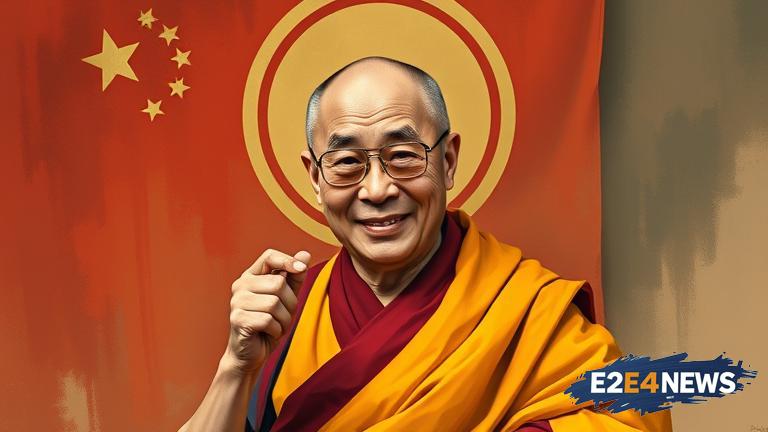The Dalai Lama, the spiritual leader of Tibetan Buddhism, has been a thorn in the side of the Chinese government for decades. As he approaches the end of his life, the question of his reincarnation has become a pressing issue. According to Tibetan Buddhist tradition, the Dalai Lama is reincarnated in a new body after his death, and the process of finding his reincarnation is typically carried out by the Tibetan government-in-exile. However, China has been attempting to exert control over the process, claiming that the reincarnation must be approved by the Chinese government. This has sparked concerns among Tibetans and supporters of the Dalai Lama, who fear that China will use the reincarnation process to install a puppet leader. The Dalai Lama has himself spoken out against China’s interference, stating that any attempt to manipulate the reincarnation process would be a violation of Tibetan Buddhist tradition. The Tibetan government-in-exile has also rejected China’s claims, stating that the reincarnation process is a matter for the Tibetan people to decide. Despite this, China has continued to push its claim, with the Chinese government stating that it has the right to approve the reincarnation of the Dalai Lama. This has led to a standoff between China and the Tibetan government-in-exile, with the international community watching with concern. The United States and other Western countries have spoken out against China’s interference, stating that the reincarnation process should be carried out in accordance with Tibetan Buddhist tradition. The issue has also sparked protests and demonstrations among Tibetans and supporters of the Dalai Lama, who are demanding that China respect Tibetan autonomy and tradition. As the situation continues to unfold, it remains to be seen how the reincarnation process will be carried out and whether China will succeed in its attempts to exert control. The Dalai Lama’s reincarnation is not just a matter of spiritual significance, but also has important implications for the political future of Tibet. The Tibetan government-in-exile is determined to ensure that the reincarnation process is carried out in accordance with tradition, and is working to build international support for its position. China’s interference in the reincarnation process is just the latest example of its attempts to exert control over Tibet, which has been under Chinese rule since 1950. The Tibetan people have long been seeking greater autonomy and respect for their cultural and religious traditions, and the issue of the Dalai Lama’s reincarnation has become a focal point for these demands. As the international community continues to watch the situation unfold, it is clear that the reincarnation of the Dalai Lama will have far-reaching implications for the future of Tibet and the Tibetan people.
